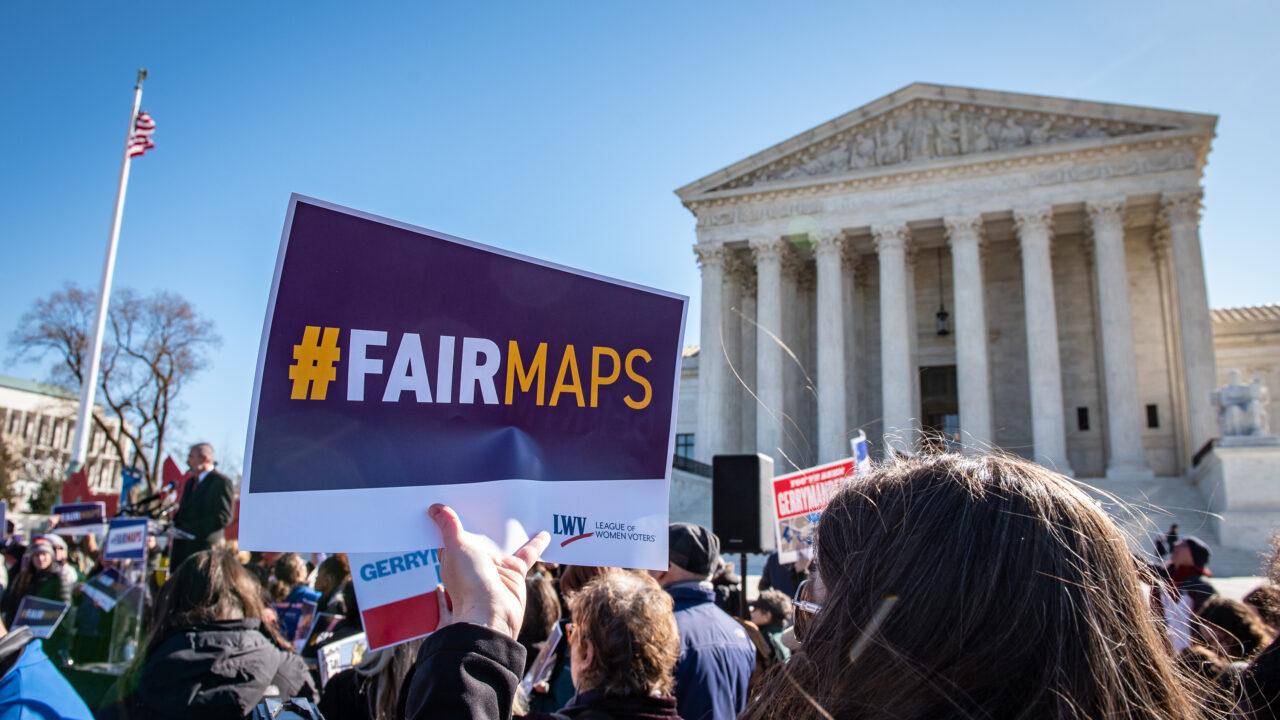The Supreme Court’s Assault on Voting Rights Isn’t Over
Does South Carolina’s updated voting map violate the 14th and 15th Amendments? Rally to End Gerrymandering. (Photo: League of Women Voters/Flickr/cc)
Rally to End Gerrymandering. (Photo: League of Women Voters/Flickr/cc)
If you think the Supreme Court’s assault on voting rights is over, think again. On Oct. 11, as it convenes its new term, the court will hear oral arguments in a “racial gerrymandering” case from South Carolina — Alexander v. South Carolina State Conference of the NAACP — that has the potential to inflict irreparable harm on minority voters.
Last term, the court surprised many observers when it struck down Alabama’s racially gerrymandered congressional voting map in a narrow 5-4 opinion written by Chief Justice John Roberts in Allen v. Milligan that concluded the map ran afoul of section 2 of the Voting Rights Act (VRA). Section 2 prohibits voting practices that discriminate on the basis of race, color or membership in a minority language group. Milligan preserved the validity of section 2, and paved the way, over protests from the Alabama legislature and state officials, for the creation of a new congressional district in which Black residents will have a voting majority.
Although Milligan has been justly praised by voting-rights advocates as a major and rare victory in a court dominated by hard-right Republican justices, it won’t have any direct bearing on the court’s ruling in Alexander. The cases are similar in that the Alabama and South Carolina maps were designed in 2021 after the 2020 census, and both diluted the power of Black voters. But the cases are also distinguishable in important legal respects, and those differences may lead to a dramatically different outcome in Alexander.
In Milligan, the Supreme Court was tasked with reviewing a lower-court ruling that Alabama’s congressional map violated section 2 of VRA, and determining whether the court’s past precedents interpreting section 2 should be overruled. The court declined to overturn its past decisions.
Alexander, by contrast, is purely a constitutional case, which requires the Supreme Court to review a lower-court ruling that South Carolina’s map violates the 14th Amendment’s Equal Protection Clause, as well as the 15th Amendment’s prohibition against racial discrimination in voting. The Supreme Court has not been asked to determine if the South Carolina map also violates the VRA.
Invoking originalist reasoning, Roberts wrote that partisan gerrymandering has existed since the founding of the republic, and that the framers of the Constitution left the practice to the states to regulate.
The claims advanced by South Carolina’s legislature and several right-wing groups that have filed amicus curiae (“friend of the court”) briefs in the Supreme Court are insidious, and appear specifically targeted to appeal to the court’s ultra-conservative majority and its regressive “originalist” view of the Constitution.
To understand those claims requires a brief primer on gerrymandering.
In the most generic sense, gerrymandering refers to the practice of drawing election maps to create an edge for a dominant party, group or socio-economic class. The term is actually a portmanteau coined after the salamander-like voting districts created by Massachusetts Gov. Elbridge Gerry in 1812 to give an advantage to his Democratic-Republican Party. Today, it commonly refers to any abusive form of redistricting.
States with more than one Congressional seat are required to redesign their voting districts every 10 years in accordance with new census data. Because redistricting is so important to the functioning of democracy, it often sparks litigation.
In the 1962 landmark case of Baker v. Carr, the Supreme Court, under Chief Justice Earl Warren, reversed years of precedent, and outlawed population-based gerrymandering, establishing the doctrine of “one man, one vote.” Henceforth, voting districts have had to be roughly equal in terms of overall population.
By the mid-1980s, the Supreme Court also proscribed racial gerrymandering — designing Congressional and state electoral districts to dilute the voting power of minorities by either “cracking” minority voters across a state to diminish their relative strength, or by “packing” them into a few districts to drain their influence in other parts of a state.
In 2019, however, the Supreme Court handed down a 5-4 opinion written by Chief Justice Roberts that held issues of “partisan gerrymandering” — the practice of designing voting districts for purely political reasons — were beyond the jurisdiction of the federal courts to address or remedy. Invoking originalist reasoning, Roberts wrote that partisan gerrymandering has existed since the founding of the republic, and that the framers of the Constitution left the practice to the states to regulate.
This is the argument advanced by South Carolina and its allies in Alexander. Although the state concedes that it purposely moved some 30,000 Black voters out of its first congressional district, it argues it did so not because of their race, but because of their political affiliation as registered Democrats. In 2020, according to exit polls, 90% of Black South Carolina voters cast their ballots for Democrats. By moving Black voters out of the first district, the state hopes to retain the seat for Rep. Nancy Mace in 2024.
Any fair-minded court committed to equal justice would easily see through the state’s specious reasoning. But the Roberts court is anything but fair-minded when it comes to voting rights.
Should the court approve of South Carolina’s end-run on race, the reverberations will be felt nationwide.
Roberts, in particular, has never been an advocate for voting rights. As a young lawyer working in the Reagan administration, he authored several memos harshly criticizing the VRA.
In 2013, as chief justice, he composed the infamous majority opinion in Shelby County v. Alabama (2013), which gutted two other provisions of the VRA that required state and local jurisdictions, mostly in the South, with histories of egregious voter discrimination to obtain advance federal approval — known as “preclearance” — before making changes to their election procedures. Roberts declared in Shelby that racial discrimination in voting practices was essentially over, writing that “things have changed dramatically” since the 1965 passage of the VRA.
Nor should we be lulled into believing that Roberts’ majority opinion in Milligan signals a change of direction in his thinking about the Constitution. While he refrained from rejecting the court’s past precedent decisions on section 2 of the VRA in Milligan, he added a gratuitous observation to the end of the opinion that all but invited future constitutional attacks on voting rights. “The Court’s opinion today does not diminish or disregard the concern that [Section] 2 may impermissibly elevate race in the allocation of political power within the States,” he wrote. “Instead, the Court simply holds that a faithful application of precedent and a fair reading of the record do not bear those concerns out here.”
In his concurring opinion in Milligan, Justice Brett Kavanaugh, the other Republican-appointee who joined the majority along with the panel’s Democrats, issued a more direct warning to voting rights advocates, asserting that the federal protections against racial gerrymandering “cannot extend indefinitely into the future.”
The stage is thus set for exactly the kind of constitutional showdown that Alexander poses. Should the court approve of South Carolina’s end-run on race, the reverberations will be felt nationwide, especially in the South, where other major voting-rights cases remain undecided and are being fiercely litigated. Another critical inflection-point in the history of U.S. constitutional law looms ahead.
Your support matters…Independent journalism is under threat and overshadowed by heavily funded mainstream media.
You can help level the playing field. Become a member.
Your tax-deductible contribution keeps us digging beneath the headlines to give you thought-provoking, investigative reporting and analysis that unearths what's really happening- without compromise.
Give today to support our courageous, independent journalists.






You need to be a supporter to comment.
There are currently no responses to this article.
Be the first to respond.